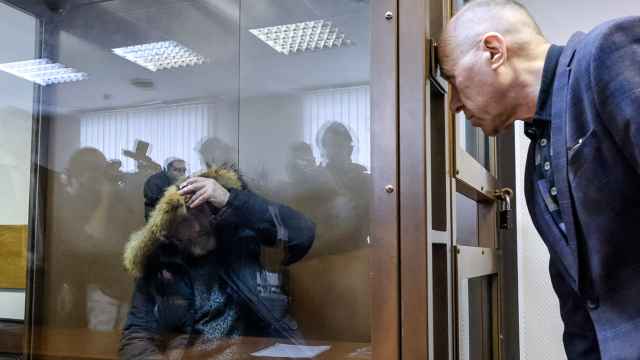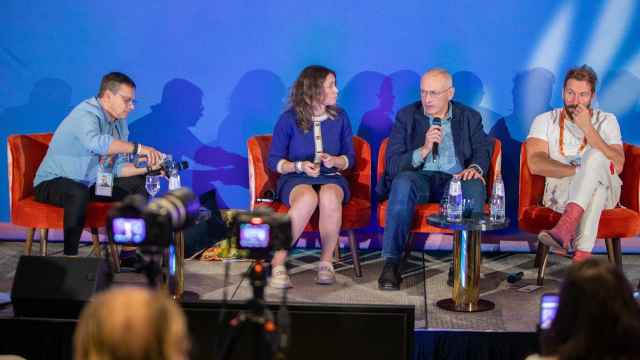The essence of President Vladimir Putin’s annual address to the Federal Assembly on Dec. 12 was that his enchantment with state capitalism and Soviet economics is continuing. Rather than promoting higher economic growth, he wanted to go after the remaining prominent private businessmen.
Russia’s most urgent economic concern is the disappearing economic growth, but only in the middle of his speech Putin arrived at the need for the “renewal of sustainable economic growth.” This time he did not blame the euro crisis, but he admitted that “the main causes of the slowdown are not external but internal.”
Putin sounded completely Soviet during his address to the nation. He seems unaware both of the collapse of the Soviet economic system and why it happened.
Liberal economists usually blame corruption, expanding state capitalism, red tape, decreasing competition and stalled international economic integration as the main causes of the declining growth. In a more positive language, Putin mentions four “new factors of development” — namely “high quality of professional education, a flexible labor market, good investment climate and modern technology.”
All are correct but hardly key. Putin boasts about the minor improvements in the business climate that have occurred in the last two years and calls for further improvements, which are to be welcomed.
His talk of technological and professional development sounds like a Soviet throwback. It makes sense to revive Soviet-style vocational training, which corresponds to apprenticeships in Germany, Switzerland and Austria, but the unmentioned critical concern is that Putin’s policies are forcing good, modern managers to emigrate.
When Putin talks about technology, it gets worse. Characteristically, he does not use Prime Minister Dmitry Medvedev’s favorite words “innovation” or “modernization.” The only thing he wants to modernize is the defense industry. In Putin’s Russia, everything has to be done by the state: “We must form a domestic demand for high technology.” He wants to do so by “using the system of state procurement and investment programs of the state corporations.”
Naturally, Putin’s state must establish technological standards, measure them and control them. He sounded completely Soviet: “I propose to create a system of statistical evaluation of the level of technology in various branches of the economy to obtain an objective picture of our competitiveness. In the Soviet period such a system worked,” Putin said. “It was liquidated, and nothing else was created. It is necessary to recreate it.”
Sorry, we have seen that show, and it was disastrous. I participated in the destruction of that system because it produced a miserably low level of technology. The iPhone and the iPad were not created by state standards but by competition on the market. Incredibly, Putin seems unaware both of the collapse of the Soviet economic system and why it happened. So here we go again.
In addition, the word privatization was missing in this speech. Putin criticized Rosneft’s purchase of TNK-BP because it occurred abroad, but the real scandal is that this was the largest nationalization since the confiscation of Yukos. Putin wants to tax the profits of Russian offshore companies, but he offers no proposal for how to do so. He could easily abolish the Russian double-taxation agreement with Cyprus, which provides the legal base for these flows, but that would hurt him and his friends personally.
It makes sense that he wants to deprive offshore private companies of state support, but the restrictive policy he outlined will persuade private businessmen to increasingly sell their companies to state corporations, further reducing competition and efficiency in the economy. Private capital will flee all the faster, further depressing Moscow’s stock market.
Putin mentions Russia’s key problem, corruption, four times, but he has little to say about how to fight it, indicating his lack of interest. He advocates external audit of the top dozens of state corporations, but this will presumably be carried out by the Audit Chamber, which is now headed by Tatyana Golikova. But she appears completely subordinate to Putin, unlike her predecessor Sergei Stepashin, who once was a competitor of Putin, so this control seems a chimera.
If Russia really wants to fight corruption, it needs to move toward competitive and open procurement of the large state enterprises. But since Putin’s closest friends are considered to have made their fortunes on such nontransparent procurements, he said nothing about that.
Currently Putin is instigating the merger of the corrupt ordinary court system and the well-functioning economic courts, which in all likelihood will render the economic courts as corrupt as the ordinary ones. Not very convincingly, Putin argued that “unifying these courts will allow us to bring judicial practice onto one track, and therefore strengthen the guarantees protecting a crucial constitutional principle, the equality of all before the law.” Of course, the president cannot state openly that he is promoting the inequality of corruption.
This speech does not advocate more market competition but discretionary state intervention. The only market Putin seems to favor is the labor market. He does use words, such as competition and entrepreneur, but rather than encouraging competition and economic freedom he calls for “targeted support for small and medium business.”
As usual, Putin becomes most incomprehensible when he arrives at the Customs Union. “We are not imposing anything on anybody. … Our integration project is based on equal rights and on real economic interests,” Putin claims. But this flies directly in the face of Russia’s severe trade sanctions that it levied against Ukraine for its intention to sign the Association Agreement with the European Union. Meanwhile, he is increasing corruption and protectionism by abrogating the TIR convention, which has facilitated the customs procedures of containers.
One of Putin’s old favorite themes, the BRICS, received just a passing mention, which makes sense after the BRICS have become a sign of economic weakness. The same is true of the Group of 20 and G8, although Russia is hosting their summits this and next year, respectively. And he said nothing about the $51 billion price tag for the Sochi Winter Olympics, which was initially budgeted at $12 billion. This omission might tell us something about what he is really worried about.
Vedomosti columnist Maxim Glinkin recently summarized the essence of the speech appropriately: “Putin told the establishment: I have returned seriously and for a long time. Everything goes according to my scenario and for the time being we are not going to change anything in essence.” Or as Putin himself put it with regard to his support for traditional values: “Of course, this is a conservative position.”
Putin and his rule appear increasingly obsolete like former Soviet leader Leonid Brezhnev, and we know what happened to Russia after him.
Anders Åslund is a senior fellow at the Peterson Institute for International Economics in Washington.
A Message from The Moscow Times:
Dear readers,
We are facing unprecedented challenges. Russia's Prosecutor General's Office has designated The Moscow Times as an "undesirable" organization, criminalizing our work and putting our staff at risk of prosecution. This follows our earlier unjust labeling as a "foreign agent."
These actions are direct attempts to silence independent journalism in Russia. The authorities claim our work "discredits the decisions of the Russian leadership." We see things differently: we strive to provide accurate, unbiased reporting on Russia.
We, the journalists of The Moscow Times, refuse to be silenced. But to continue our work, we need your help.
Your support, no matter how small, makes a world of difference. If you can, please support us monthly starting from just $2. It's quick to set up, and every contribution makes a significant impact.
By supporting The Moscow Times, you're defending open, independent journalism in the face of repression. Thank you for standing with us.
Remind me later.






